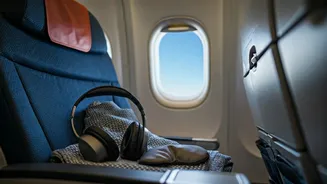Pre-Flight Preparation Essentials
Before even stepping onto the plane, strategic preparation is key. Proper planning can significantly influence your comfort levels during the flight. Start
with choosing your seat wisely; if possible, opt for an aisle seat to allow easy movement. Consider seats near the emergency exits for extra legroom, but note that some may not recline. Pack smart. Include essentials such as a travel pillow, eye mask, earplugs, and compression socks. These items are indispensable for promoting relaxation and reducing swelling. Stay hydrated by drinking plenty of water in the days leading up to your flight. Avoid excessive alcohol and caffeine, as they can lead to dehydration. Do some light stretching and exercise before you leave for the airport to loosen up your muscles and improve circulation. Packing a small personal care kit with toiletries will further enhance your journey.
In-Flight Comfort Techniques
Once airborne, several techniques can help you navigate your flight more comfortably. Proper posture is crucial. Sit with your back straight and supported, utilizing your lumbar support or a rolled-up pillow for added assistance. Regularly get up and walk around the cabin to combat stiffness and boost circulation. Set a timer to remind yourself to move every hour, even if it's just to stretch in your seat. Stay hydrated. Drink plenty of water throughout the flight to counter the dehydrating effects of the cabin air. Avoid sugary drinks and excessive alcohol. Practice gentle exercises in your seat. Simple stretches like neck rotations, shoulder rolls, and ankle flexes can alleviate tension and promote blood flow. Engage your core muscles by tightening and releasing them. Use entertainment wisely; adjust the screen distance to reduce eye strain, and take breaks from the screen to rest your eyes.
Nutrition and Hydration Advice
What you consume during your flight impacts your comfort and well-being. Proper hydration is critical, so bring a refillable water bottle or request water from the flight attendants regularly. Avoid excessive salt intake, which can lead to bloating. Select lighter, easily digestible meals and snacks. Avoid heavy, greasy foods that can cause digestive issues. Consider packing your own healthy snacks such as fruits, nuts, or energy bars to avoid less nutritious options. Limit alcohol intake, as it can worsen dehydration and jet lag. The cabin's dry air significantly contributes to dehydration; therefore, frequent water intake helps counteract these effects, making the overall flight experience far more pleasant.
Dealing With Jet Lag
Jet lag can disrupt your sleep cycle and overall enjoyment of your travel. To minimize its effects, adjust your sleep schedule gradually in the days leading up to your flight. Set your watch to the destination time as soon as you board the plane. Try to sleep during the flight's corresponding night time at your destination. Avoid caffeine and alcohol before bed to improve sleep quality. Upon arrival, expose yourself to natural light to help regulate your body clock. If possible, take a short nap, but avoid long ones that can further disrupt your sleep cycle. Stay active and eat regular meals to help your body adapt to the new time zone. Consider using melatonin supplements, under a doctor’s guidance, to help regulate your sleep-wake cycle.
Post-Flight Recovery Techniques
Your journey to comfort doesn't end when the plane lands. Focus on post-flight recovery to rejuvenate your body. Drink plenty of water to rehydrate after the flight. Engage in light exercise or stretching to boost circulation and relieve stiffness. Take a warm shower or bath to relax your muscles. Avoid strenuous activities immediately after landing. Rest and get adequate sleep to help your body recover from the travel fatigue. If necessary, consider taking a mild pain reliever for any muscle aches. If you have any serious concerns, consult a doctor. Staying hydrated and getting sufficient rest is essential to minimizing the impact of air travel on your body.












